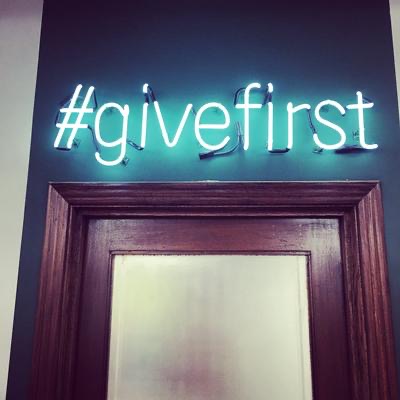“How is an early-stage founder expected to interpret the Give First philosophy?”
That’s the polite way of rewording a question Keith Coleman, Founder of Fraudmarc (Techstars Atlanta 2017), posed to Brad Feld and me in an email a little while back.
Keith got our attention with his subject line, “give first, finish last.”
His email clued us in to a difficulty he and other Techstars founders have had—or are still having—in trying to “Give First” at the same time they were rightly focusing their time and energy on the very survival of their companies.
In conversations with these other Techstars founders, Keith kept hearing that Give First was seen as something primarily for entrepreneurs and investors who had already “made it” and who, both on a time-based (mentoring) and a philanthropic (money-giving) level, had the capacity to truly give.
Challenged by Keith’s email, Brad and I realized we needed to think more deeply about how we were articulating Give First, what it means to us as individuals, and what it means to Techstars as a whole.
To us, the question became, “How can we do a better job at telling founders how, when, why, and if to apply Give First in the appropriate way at every step of their journey?”
We invited Keith onto the podcast to discuss it further. It made for a great conversation and I invite you to listen to the full episode.
As Brad and I are happy to acknowledge, Give First is an evolving philosophy – and there’s no authoritative view yet on what it is.
In Brad’s case, his personal interpretation of Give First evolves from his advice to “give before you get” in his book Startup Communities (2012).
Around the same time, Adam Grant’s influential book Give and Take (2013) drove home the value of “giving” on a personal career level.
At Techstars, #GiveFirst has evolved from a hashtag to a philosophy that we try to encourage our network of mentors, founders, community leaders, and investors to embrace—and, in turn, to instill in others.
So how should an early-stage founder internalize Give First and carry it forward? I believe the answer starts by recognizing what mentors are doing—and understanding that they would love to see you and your business give back over time in ways that are appropriate for your business. Give First is not about doing anything that will cause pain or stress to your business.
In Keith’s case, as founder of Fraudmarc, he recognized the “awesome” experience of benefiting from the Give First ecosystem and joined other founders in making the Pledge 1% commitment to the Techstars Foundation.
During our conversation, Brad explained how Keith’s Pledge 1% commitment did many potentially powerful things for Fraudmarc, even if Keith couldn’t feel or quantify them at the time. It meant something to make that pledge. It created stronger personal connections within the Techstars universe. It helped Keith, as a founder, shape the cultural norms of his company—and founders should never forget that creating the right kind of culture can have a big impact on future recruiting and retention. Above all, Keith’s pledge ensured that people in the Techstars universe, including Brad and me, would prioritize his call and be there to give him advice if things did ever get bumpy.
Are those benefits—including the knowledge that there are people with both an ability and a desire to help guide you in some future moment when you may really need it—tangible and quantitative? Maybe not. And that’s why people who look to measure every transaction based on narrow, quantitative benefits, may never embrace Give First. But as Brad points out, there will always be some people who will never subscribe to any particular philosophy.
As we wrapped up our discussion, we asked Keith for his advice to us. He told us:
1) Keep encouraging people down this path.
2) Make clear that, on a philanthropic level, Give First is something people who have “made it” can do at a different level than founders who are just starting out.
3) Communicate to early-stage founders how (and when) they can apply Give First to the day-to-day operations of their business—and share examples of how it has helped a company tangibly to do that.
Going forward, I’ll be taking on the challenge of gathering more examples of small, actionable things a founder can do to embrace Give First even in the earliest days of the company, and I’ll continue, I hope, to be of help to founders like Keith as they build companies strong enough to Give First at an even higher level later.
The conversation around Give First is always ongoing.
So if you have any thoughts about what early-stage founders can do to Give First in ways that are appropriate for their timescale and resources, please do leave a comment below… Thanks!


